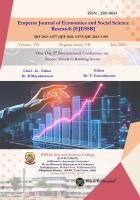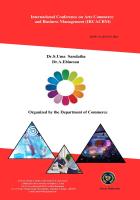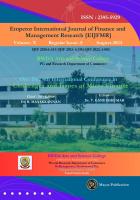- Home
- Books
-
Conference
- "INTERNATIONAL PERSPECTIVES ON RESEARCH METHODOLOGY: CHALLENGES AND OPPORTUNITIES"
- Artificial Intelligence in Finance and Economics
- Behavioral finance
- Day 5th International conference Recent Trends in Banking Sector
- International Conference on Innovations and Transformations Impacting Economy and Business in the Digital Era
- International Conference on Multidisciplinary Research Towards Sustainable Developmen
- International Conference on Social Science, Management and Technology Modern Era
- Two Day International Conference on Financial Innovation and Economic Development
- Emperor Award Name
- International Conference on Multidisciplinary Research
- Journals
- Research Projects
- Services
- Submit Article
- Video Gallery
Dr. Ambedkar’s thoughts on Indian Economy
About the book
Description
The two day National Conference on Dr. Ambedkar’s Thoughts on Indian Economy was organized by Department of Econometrics, School of Economics, Madurai Kamaraj University during 15 th & 16 th October, 2018. Altogether 80 delegates were attending the conference and offered an ideal platform for experts, economist, social scientists, policy makers, Principal Architecture of Indian Constitution and researchers to talk over and debate the Dr. Ambedkar contribution to Indian economy and its implications in past and present. Keeping this in mind, the plenary and technical sessions were organized by giving enough scope for exchange of different views and perspectives. The National Conference received an overwhelming response from all over the country to our call for papers and abstracts. We received 63 papers and abstracts, of which 60 oral presentations were spread over 4 technical sessions each focusing on a particular theme. The present volume contains 17 selected papers on various economic thoughts of B. R. Ambedkar. Ambedkar views on Indian Economy, especially policies intend to uplift the poor sections of the society are significant which have been much debated and attracted the attention of the researchers and policy makers. Ambedkar has talked much about agricultural reforms in the country in his works “small holdings in Indian and their remedies” (1917) and also in “status of minorities” (1947). He stressed that the holdings of lands by a few people is an acute problem of Indian agriculture, which has several disadvantages, like difficulties in culture and utilization and resources, increasing loss, low productivity, inadequate income and low standard of livelihood. Ambedkar suggested state socialism as a solution to economic inequality in the country. Dr. B.R. Ambedkar has stamped critical accomplishment in various fields which are dynamic and multidimensional. Along these lines, his contribution is exceedingly significant in any setting of Indian society. Indian economic system at present is facing several issues like that at the time of Dr. B. R. Ambedkar as instability of monitory inciting increase, its money related implications and its unequal ramification for various strata of society, uneconomical open consumption and growing fiscal deficits, extending incongruities of income and assets, and then onward. Breaking down his economic conviction framework, it is to state that India could have been more perfect if his contemplations had been adopted in its real soul. The problem of unfamiliarity of Ambedkar economic thoughts has caused lack of discussion in his major contributions. In this book aims to establish a broad picture on Ambedkar economic ideas. We trust that the readers will discover this book useful for further inquiry, teaching policy formulation and plan execution. The conference organizing secretary and organizing committee are grateful to all those who have made the conference a great success. We along with contributors to the volume are deeply intended to the authorities of Madurai Kamaraj University, Madurai and Dr. D. Swamikannan, Professor, Chairperson &Head, School of Economics and Dr. S Pushparaj, Associate Professor & Head, Department of Econometrics, School of Economics Madurai Kamaraj University, for his constant support and cooperation in bringing out this volume. We are also grateful for the work done by R. Mohan, Research Scholar, P.Maneesh, Research Scholar, R. Sankaranarayanan, Research Scholar, L. Vadivel, Research Scholar and G. Mani, Research Scholar, T. Sathya, M.Phil Scholar in the School of Economics with regard to arrangement of articles and corrections carried out for a month.
Details
ISBN
978-93-87756-48-9
Imprint
Mayas Publication
Published
2018
Copyright
Copyright © 2026 Mayas Publication
Publishing Limited. All rights reserved.
You currently don’t have access to this book, however you can purchase separate chapters directly from the table of contents or buy the full version.
Purchase the book




